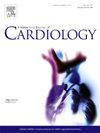二尖瓣反流再次手术和首次手术的疗效:一项全国性研究。
IF 3.2
2区 医学
Q2 CARDIAC & CARDIOVASCULAR SYSTEMS
引用次数: 0
摘要
本文章由计算机程序翻译,如有差异,请以英文原文为准。

Outcomes of mitral valve reoperation and first-time surgery for mitral regurgitation: A nationwide study
Background
While mitral reoperation has been assumed to carry higher surgical risk than first-time mitral surgery, outcomes of this procedure remain uncertain.
Aims
To examine characteristics and outcomes associated with mitral valve reoperation and first-time surgery for mitral regurgitation.
Methods
Patients undergoing surgery for mitral regurgitation were identified using Danish nationwide registries. The population was categorized into 1) patients undergoing first-time mitral surgery, 2) patients undergoing mitral reoperation. Mortality rates were examined during 180-day follow-up using Reverse Kaplan-Meier and Multivariable Cox-analysis.
Results
In total, 7734 patients underwent surgery for mitral regurgitation. Of these, 428 patients also underwent mitral reoperation. Compared to first-time surgery, reoperated patients were younger (median 64.9 and 66.7 years) and had more cardiovascular comorbidities including atrial fibrillation (61.6 % and 38.8 %) and heart failure (48.7 % and 29.9 %). Median time to reoperation was 2.3 years. Prosthetic replacement was performed in 34.0 % of first-time surgeries and 78.7 % of reoperations. Mortality was 7.1 % following first-time surgery and 10.1 % following reoperation. Following first-time surgery, factors associated with increased mortality rate was prior myocardial infarction (HR = 1.98, 95 %CI 1.62–2.41), heart failure (HR = 1.59, 95 %CI 1.33–1.90), concomitant aortic valve surgery (HR = 1.61–1.27, 95 % CI 1.27–2.02) and bypass grafting (HR = 1.58, 95 %CI 1.31–1.91). Following reoperation, heart failure was associated with increased mortality rate (HR = 2.23, 95 %CI 1.17–4.60).
Conclusions
Patients undergoing mitral reoperation are young but have developed high burden of comorbidities at the time of reoperation. In spite of this, outcomes of mitral reoperation were acceptable, reflecting that this procedure can be performed safely in selected patients.
求助全文
通过发布文献求助,成功后即可免费获取论文全文。
去求助
来源期刊

International journal of cardiology
医学-心血管系统
CiteScore
6.80
自引率
5.70%
发文量
758
审稿时长
44 days
期刊介绍:
The International Journal of Cardiology is devoted to cardiology in the broadest sense. Both basic research and clinical papers can be submitted. The journal serves the interest of both practicing clinicians and researchers.
In addition to original papers, we are launching a range of new manuscript types, including Consensus and Position Papers, Systematic Reviews, Meta-analyses, and Short communications. Case reports are no longer acceptable. Controversial techniques, issues on health policy and social medicine are discussed and serve as useful tools for encouraging debate.
 求助内容:
求助内容: 应助结果提醒方式:
应助结果提醒方式:


